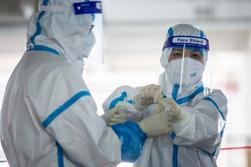 A health worker (right) puts a test sample into a container after a taxi driver (not pictured) was tested for COVID-19 at a makeshift testing station in a carpark in Hong Kong on July 19, 2020. (ISAAC LAWRENCE / AFP)
A health worker (right) puts a test sample into a container after a taxi driver (not pictured) was tested for COVID-19 at a makeshift testing station in a carpark in Hong Kong on July 19, 2020. (ISAAC LAWRENCE / AFP)
HONG KONG - Medical experts in Hong Kong called for tighter social distancing measures, closer cooperation with the mainland and the pre-purchase of vaccines to fend off the most serious COVID-19 outbreak the city had ever faced.
Their call came as the city saw triple-digit infections for the third day in a row. About half of those were not traceable epidemiologically, indicating an unknown transmission chain in the community
Their call came as the city saw triple-digit infections for the third day in a row. About half of those were not traceable epidemiologically, indicating an unknown transmission chain in the community. Hong Kong recorded a total of 884 confirmed cases from July 10 to 23, almost 40 percent of its total tally of 2,249 by Thursday.
David Hui Shu-cheong, chairman of the Department of Medicine and Therapeutics of the Chinese University of Hong Kong, said if the number of COVID-19 cases shows no signs of declining before early next week, the city would have to consider tighter social distancing measures, such as banning dine-in services in restaurants all day.
ALSO READ: HK reports 1 more death, over 100 local virus cases for 3rd day
It is hard to predict whether the pandemic will reach its peak in a few days, Hui said at another local radio program on Thursday.
But the government’s tightened measures have taken effect, as the infections recorded lately haven’t grown geometrically, he added.
In the meantime, the scientist urged the government to lose no time in pre-ordering vaccines under production worldwide.
“If a lot of countries have ordered vaccines, Hong Kong won’t have the chance to buy any vaccine due to the short supply”, Hui said.
ALSO READ: City records new daily high of COVID-19 cases
He also said that it would be impossible for the government to purchase 7 million vaccines. Priority for receiving vaccines should be given to the elderly, long-term patients, medical staff or other high-risk groups, he said.
Yuen Kwok-yung, chair of infectious diseases in the Department of Microbiology at the University of Hong Kong, cautioned that, if COVID cases continued to grow geometrically after 7 to 14 days, a blanket ban to prohibit people leaving their homes would be needed.
“I always have confidence in Hong Kong people. When they see cases are rising, they will get nervous”, Yuen said in a radio interview. “Wear the mask and do not eat in restaurants. This is really important.”
In an interview with local online media, Liu Shao-haei, president of Hong Kong College of Health Service Executives and a council member of the Management Society for Healthcare Professionals, said now is the right time for the government to seek help from the Chinese mainland.
ALSO READ: HK orders masks indoors in public as daily cases hit record
Supported by the medical resources of the Guangdong-Hong Kong-Macao Greater Bay Area, Hong Kong could carry mass testing in a short time.
He suggested conducting mass virus testing in areas close to where clusters of cases were found to identify asymptomatic cases and cut off the community transmission chain as soon as possible.
Liu suggested conducting mass virus testing in areas close to where clusters of cases were found to identify asymptomatic cases
Liu suggested the government establish at least 500 beds in AsiaWorld-Expo as rehabilitation wards to relieve the burden of Hong Kong’s already-strained hospitals.
The government is setting up quarantine and community treatment facilities at AsiaWorld-Expo as a temporary quarantine center for residents of residential care homes for the elderly and a community treatment center. The first hall, which is almost complete, will provide 100 beds and was set to be in use by Friday. The second hall, with a capacity of 150 to 200 beds, will be expanded.


